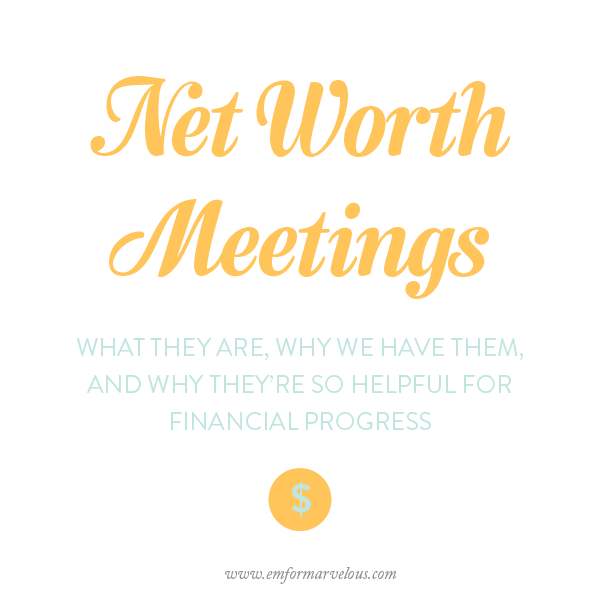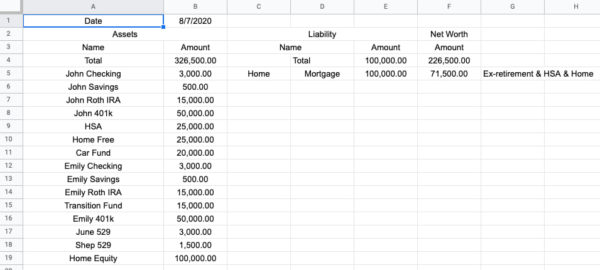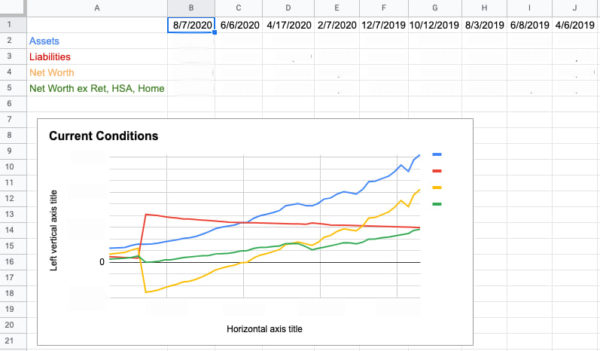Marvelous Money: Our net worth meetings
In honor of our anniversary, I have a relationship-themed Marvelous Money post for you today! (Boy, between this and my post earlier this week, I’m sure leaning hard to the unromantic side of married life for anniversary 8, ha!) Today, I thought I’d tell you a bit about our bi-monthly net worth meetings: what they are, why we have them, why we love them, and why they’re incredibly helpful for our financial progress.

What is a net worth meeting?
A net worth meeting is our chance to review our family’s finances in the big picture. We celebrate progress, check in on our financial goals, discuss challenges and opportunities, and do a bit of nitty-gritty budget upkeep. And, as you might have guessed from the name, we calculate our family’s net worth.
We hold our official net worth meetings every other month, usually in the second weekend of the month unless we’re traveling or otherwise occupied. In this season of our lives, they’re held in the afternoon while the kids are resting, or in the evening.
Tell me more about what you do in this meeting.
Well, first John calls the meeting to order, then we take attendance… j/k j/k. “Net worth” sounds very official, but our meeting is not! Generally, we like to get the small stuff out of the way first by entering any outstanding transactions into our budget doc. (We each have responsibility for entering certain cards and accounts into the doc, which we do about every two weeks, but this is an opportunity to catch up as needed and ask each other any categorizing questions.)
Once the budget is fully up to date, we’ll flip to the “Net Worth” tab of our doc. (For more about the custom Google Doc we use to track our budget, read this post! It’s a bit out of date, but the premise is still the same.) Here’s what it looks like:

Note: these numbers are completely made up, so please do not read anything into them :)
On the left, we’ve listed every single place we have money or an asset. This includes our checking and savings accounts, our IRAs and 401ks, our investment accounts, our kids’ 529 accounts, and our home equity. Yours might include other categories. For us, right now, this is a total of 20 places (I’ve simplified above).
One by one, we log into each of those accounts and enter the current amount as of that date (to be exact, one of us logs in and reads out the totals, the other is the typist). For the home equity line, we simply subtract the remaining principle of our mortgage from the amount we paid for our house to keep things simple. In cell B4, a formula totals everything together – our assets.
In the middle, you can see a column for our liabilities. Currently, this is just our mortgage, but previously we had entries for car loans and student loans. We do the same thing here – log into the account and enter the current number.
All the way to the right, a formula in F4 calculates our net worth – our total assets (B4) minus our total liabilities (E4). We also like to track our more liquid net worth, which for us is our net worth minus our retirement accounts, our HSA, and our home equity. That’s in cell F5.
Next – and this is the highlight of the meeting! – we click over to the tab next door. This tab is called Net Worth Over Time, and for us, it dates back to July 2012 – two months before our wedding, when we began having these meetings! This is what it looks like:

Obviously I have deleted the numbers, though that is our actual chart over the last 8 or so years. This screenshot only shows a fraction of the months we’ve tracked – rows 2-5 scroll and scroll to the right to go all the way back to 2012!
To update this tab, we enter the new numbers for assets, liabilities, net worth, and liquid net worth and then adjust the graph. Generally, it goes up – which is exciting! It’s nice that you’ll see the line go up whether you’re focused on paying down debt or building up savings.
That’s usually the meat of the meeting, but if there’s a challenge or opportunity we want to talk through, this is often a great time to do so. We are comfortable talking about money and it comes up regularly in conversation, so we usually don’t wait for one of these meetings to, say, talk about an upcoming trip or change in our investment strategy, but if you’re newer in the process, using this set aside time for that might be helpful.
Finally, because I know the budget is as up-to-date as it will ever be, I’ll go through it category-by-category to make sure we’re on track for each one, and adjust as necessary (of course, always making sure our total in the ISE is in the black!). Again, for more on how we budget, go here.
Why should I have one of these meetings?
First and foremost, we consider these meetings an opportunity for celebration. They’re a way to recognize the good decisions we’ve made and the willpower we’ve exercised, to cheer ourselves on to do more of those things. Saving money is often not “exciting,” especially over a long timeframe, and so we find it helpful to build in excitement where we can, to keep us motivated for the long haul.
A comment my friend Kelly made years ago on an MM post brought home why this is important. She commented that she often feels like the money she puts into her 401k “isn’t real,” since it’s taken right out of her paycheck and she basically never sees it again. While in some ways this is good (you don’t need or want to be checking in on longterm investments constantly!), you’re also missing out on a chance for motivation if the money you’re saving never becomes real to you. If you see the amount adding up over time, and watch compounding work its magic, you even might be motivated to save MORE!
Second, working toward a goal together is great for a relationship. It gets you on the same team! Whether it’s a money goal or a fitness goal or a trip you’re working toward, feeling unified in the things you want bonds you together. These meetings help with that.
The final and really important reason to have a meeting like this is so that both partners have visibility into the family’s finances. In a very practical sense, they help make sure both partners know what accounts exist, where they are held, how to log into them, and approximately how much money exists and where. No matter how duties are split, everyone should know the basics.
One final point to address: I hope this has been clear throughout this post, but these meetings are not about us counting up our money for the sake of having money. Having money is not evil, but it’s also not the point. For us, the point is freedom – freedom to live and give how we wish, to the best of our ability and for the glory of God. We also believe our money has been entrusted to us, and we want to be wise managers of it. A wise manager checks in and makes adjustments to get the most out of what they have, and these meetings are one way to do that.
Friends, I would love to hear: do you currently have a financial check-in? (And YES, you can totally have one of these if you’re single!) Any questions about our meetings, or requests for a future MM post?
P.S. Building an emergency fund, making a yearly budget, and prioritizing spending versus saving




















This was so inspiring I almost sent my husband a recurring Google calendar event before he even woke up this morning – but then I figured I should at least warn him first :) Ha! This was so helpful. Thank you!
This literally made me LOL, Megan! So glad it was helpful!
Always love these posts! We also have a net worth meeting and it definitely pushes you to see (and celebrate!) how your money is working for you.
I love hearing that, friend!! Yes it does.
Yes! We do this a few times a year and it motivates us! I love your money posts!